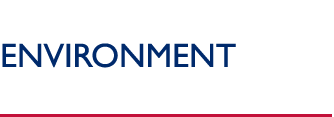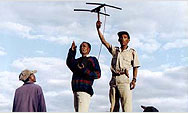 |
LWA: Global Water for Sustainability Program
(IMCAFS-GLOWS)
Program Summary
 |
Informal clusters of housing near water bodies often lack access
to clean drinking water and sanitation facilities, which leads
to serious threats to the health of both humans and ecosystems |
The GLOWS program promotes the integrated management of water resources and aquatic ecosystems to simultaneously maximize the economic and social benefits derived from water resources while sustaining freshwater ecosystems. Working at a basin, watershed, or aquifer scale, the GLOWS consortium provides expertise across the policy, governance, institutional, educational, and technical dimensions of integrated water resources management (IWRM). Approaches combine advanced analytical techniques, innovative mechanisms for sustainable resource management and biodiversity conservation, community-based programs in poverty alleviation, improved sanitation and potable water supply, and global networking of local NGOs to achieve IWRM objectives. With field offices in most USAID countries, the consortium possesses the infrastructure and skilled staff to plan and implement projects efficiently wherever USAID operates. The program includes three key elements:
- Strengthening Cooperative Governance and Strategic Decision-Making for IWRM by:
- Promoting citizen participation, community involvement, intergovernmental cooperation and collaborative approaches to decisionmaking in IWRM
- Building capacity of government officials and administrators, NGOs, and community members in effective development, planning, management, and administration of complex IWRM activities
- Supporting innovative and sustainable technical interventions by:
- Promoting best practices in water demand management and pollution prevention
- Fostering sustainable fisheries, aquaculture, and aquatic ecosystem protection
- Working with communities to provide sustainable water and sanitation services
- Fostering global learning and local capacity building in IWRM by:
- Sharing information and disseminating lessons with USAID Missions and other peers in the field
- Recruiting and training talented citizens of USAID Mission countries, in order to cultivate local and regional leadership and capacity to implement world-class IWRM activities
Regional Activities
The GLOWS Program is initiating its first core-funded pilot activities in the LAC, AFR, and ANE regions, reflecting the range of geographical, cultural, and socioeconomic settings in which USAID operates. Pilot projects are designed to be proving grounds for new technical, economic, organizational, and political approaches to IWRM in selected river basins. They will also enable the consortium to engage in field activities immediately and to rapidly consolidate a system for collaboration and coordination among partners. Lessons learned through pilot projects will be applied to other USAID program activities to advance overall learning and experience of the Agency in integrated water resources management.
For fact sheets on GLOWS activities:
- Integrated Water Resources Management in the Mara River Basin, Kenya and Tanzania (PDF 251KB)
- Transboundary Water for Biodiversity in the Mara River Basin, Kenya and Tanzania
(PDF 162KB)
- Integrated Water Resources Management in the Pastaza River Basin, Ecuador and Peru (PDF 222KB)
- Integrated Water Resources Management in the Wakal River Basin, India (PDF 207KB)
For success stories of GLOWS activities:
Partners
The IMCAF-GLOWS team is comprised of international and local partners with extensive experience and expertise in integrated water resources management. The core team consists of:
- Florida International University (FIU): FIU is the lead organization of the GLOWS consortium. The Institute for Sustainability Science, the Institute for Public Management and Community Service, and other university units will bring specialized expertise in community-based governance, sustainable watershed and ecosystem management, advanced training, and interdisciplinary analytical techniques as applied to IWRM.
- World Wildlife Fund (WWF): WWF is the world’s largest and most experienced international conservation organization, with a Global Freshwater program working to promote policy reforms, best practices, conservation of wetlands and other critical ecosystems, and poverty reduction of dependent communities. For more information, visit www.panda.org.
- World Vision (U.S): A Christian relief and development organization, World Vision works in nearly 100 countries to provide assistance in a variety of development sectors including emergency relief, safe water supplies and improved sanitation, food security, agriculture, and economic development.
- CARE: CARE is a leading humanitarian organization fighting global poverty, with significant expertise in increasing access to clean water and sanitation, expanding economic opportunity, and protecting natural resources, including a special focus on working with poor women to help whole families and entire communities escape poverty.
- Winrock International: Winrock International is a nonprofit organization that works with people in the United States and around the world to increase economic opportunity, sustain natural resources, and protect the environment, in areas including water and environment, small-scale irrigation, and multiple use systems.
- LakeNet: This network of more than 1,600 individuals and organizations from more than 100 countries works on the conservation and sustainable development of lakes around the world.
- Amizade: Amizade is an organization that encourages intercultural exploration and understanding through community-driven service-learning courses and volunteer programs, having help placed over 2,600 American volunteers over the last eight years.
IMCAFS Cross-Cutting Program
In recognition that coastal and freshwater ecosystems are intimately linked, USAID will support collaboration between the SUCCESS and GLOWS efforts in knowledge management and capacity building, as well as implementation of selected pilot activities or Associate Awards. Both programs will also make use of American volunteers to promote greater networking among U.S. professionals and those in the regions and countries where the LWA operates.
For more information, visit http://glows.fiu.edu/
Back to Top ^
|



